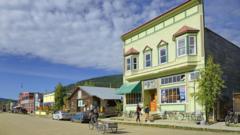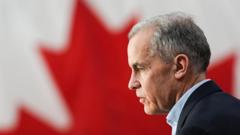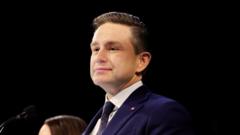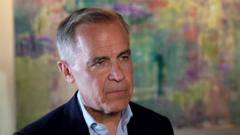In a significant political development, the mayor-elect and councilors of Dawson City, a small town in the Yukon Territory with 2,400 residents, have found themselves in a stalemate over the requirement to pledge allegiance to King Charles III. Stephen Johnson, the mayor-elect, along with the new council, was scheduled for a swearing-in ceremony but opted not to proceed with the oath, citing solidarity with an indigenous colleague voicing concerns regarding the Crown's history with Indigenous peoples in Canada.
**Dawson City Council Disputes Oath to the King Amid Indigenous Concerns**

**Dawson City Council Disputes Oath to the King Amid Indigenous Concerns**
A newly elected council in Dawson City, Yukon, faces challenges after refusing to take an oath of allegiance to King Charles III.
According to Yukon law, newly elected officials must take the Oath of Allegiance within 40 days of their election; failure to do so renders their victory void. This means the council has until December 9 to resolve the issue, as they cannot assume official duties until the oath is taken. Johnson clarified that their decision stems from a place of respect and solidarity with Darwyn Lynn, a member of the Tr’ondëk Hwëch’in First Nation: “This isn’t an anti-monarchist stance. We just wanted to show unity within our council,” he expressed.
The council has proposed an alternative oath to Yukon provincial officials, and while the Department of Community Services confirmed receipt of the request, there has been no further comment on its approval. Former mayor Bill Kendrick voiced hope for a swift resolution so that the new council can begin their governance. Community sentiments on the situation differ widely, with some deeming the oath unnecessary while others view it as a vital piece of Canada’s governance system.
Dawson City is steeped in historical significance, being central to the Klondike Gold Rush in 1896, and it sits on land that has been traditionally inhabited by the Tr’ondëk Hwëch’in people, who were displaced after the influx of settlers during the gold rush. The Canadian government has increasingly acknowledged its past treatment of Indigenous peoples, with Prime Minister Justin Trudeau explicitly addressing its colonial legacy. The debate over the oath reflects ongoing discussions in Canadian society regarding the monarchy's relevance, with previous instances of elected officials refusing such oaths, as seen in Quebec and Parliament.
The council has proposed an alternative oath to Yukon provincial officials, and while the Department of Community Services confirmed receipt of the request, there has been no further comment on its approval. Former mayor Bill Kendrick voiced hope for a swift resolution so that the new council can begin their governance. Community sentiments on the situation differ widely, with some deeming the oath unnecessary while others view it as a vital piece of Canada’s governance system.
Dawson City is steeped in historical significance, being central to the Klondike Gold Rush in 1896, and it sits on land that has been traditionally inhabited by the Tr’ondëk Hwëch’in people, who were displaced after the influx of settlers during the gold rush. The Canadian government has increasingly acknowledged its past treatment of Indigenous peoples, with Prime Minister Justin Trudeau explicitly addressing its colonial legacy. The debate over the oath reflects ongoing discussions in Canadian society regarding the monarchy's relevance, with previous instances of elected officials refusing such oaths, as seen in Quebec and Parliament.






















